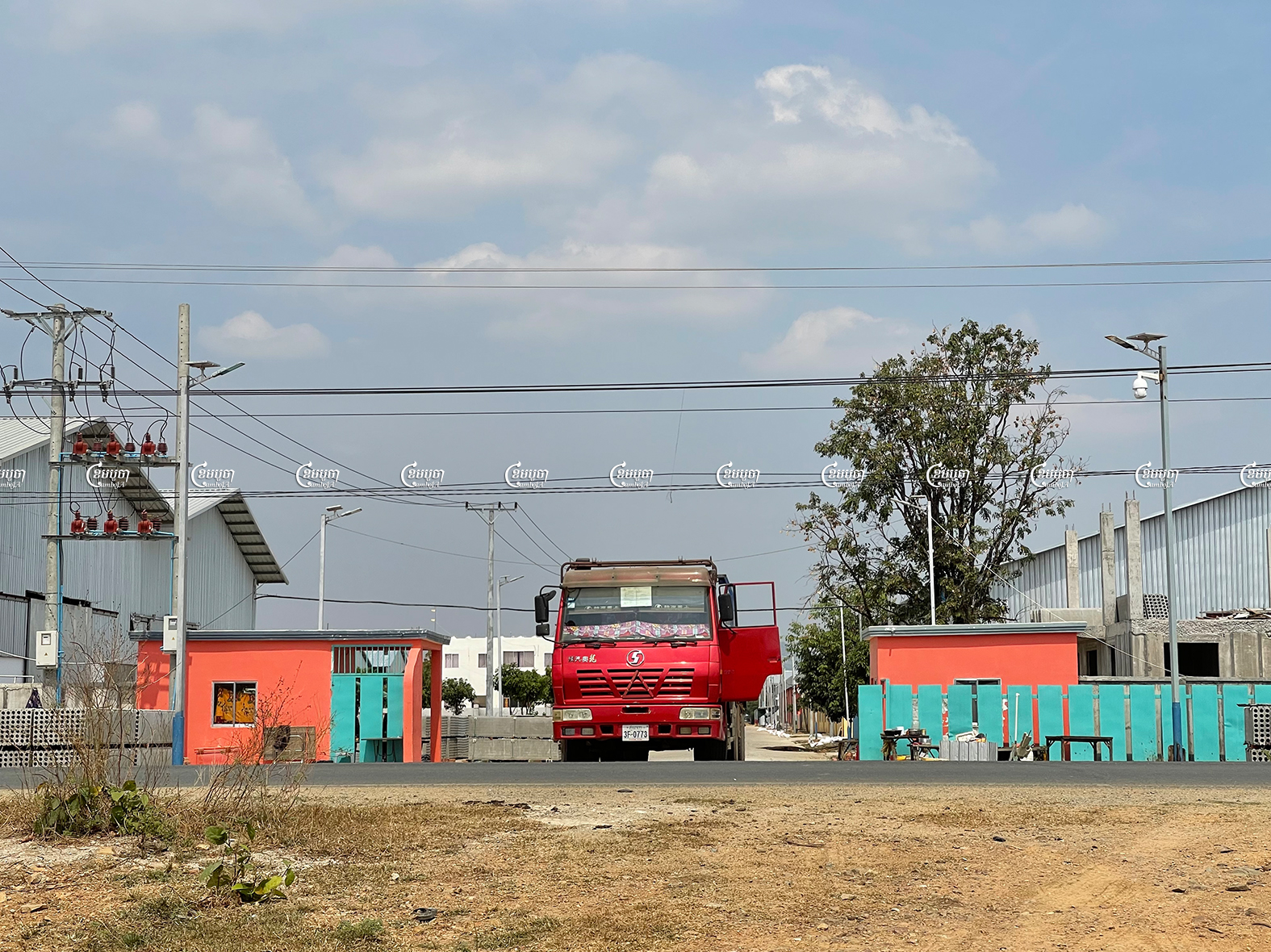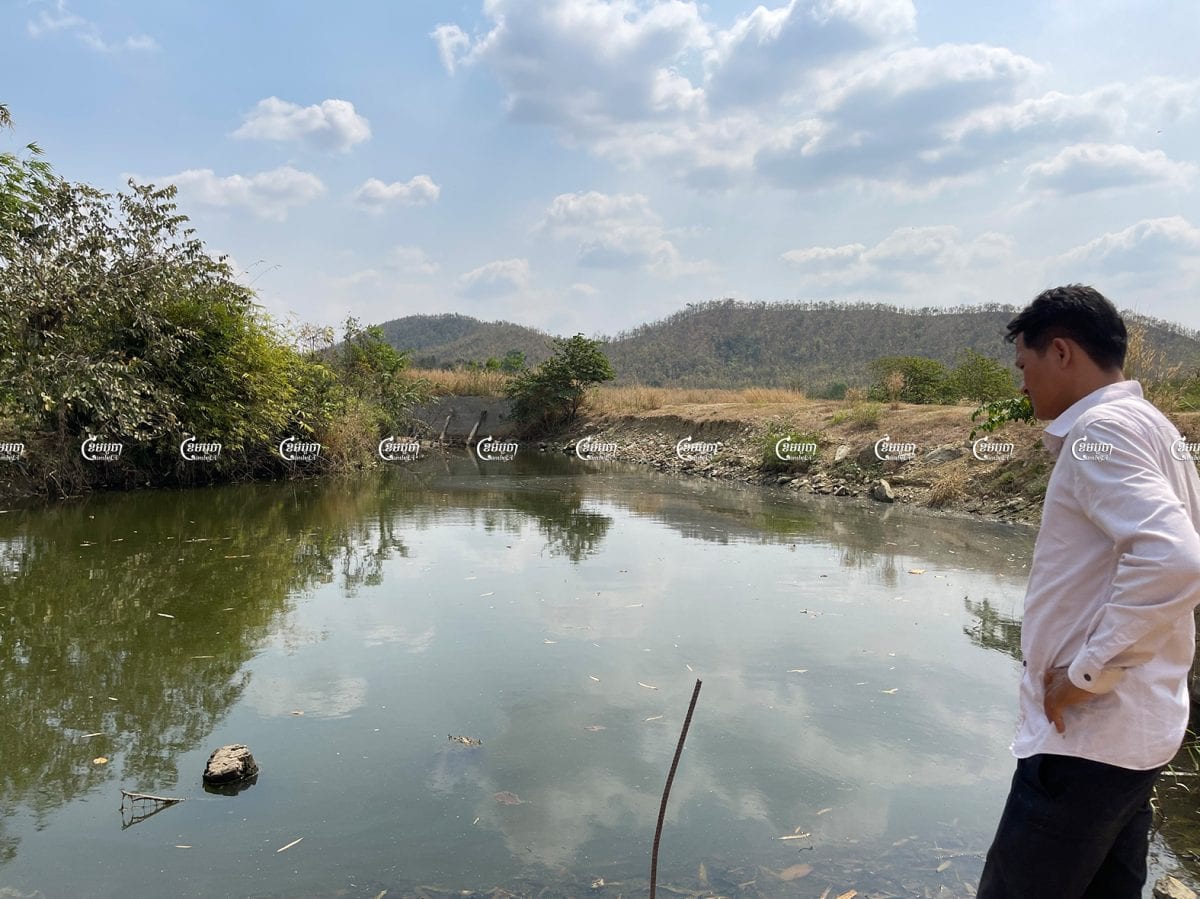A factory in Kampong Speu province has continued to dump waste into a nearby stream that serves as a lifeline for hundreds of local families. Despite years of community complaints and repeated pledges from provincial authorities to address the pollution, though, locals say they see little evidence that the government will act on the problem.
Hundreds of villagers from two communes in Kampong Speu province’s Samraong Tong and Oral districts have complained about the reeking, gurgling waters that have issued from the factory for nearly three years since the factory began operations.
Hel Tha from Oral district’s Tuol Thnong Village, whose house is about 200 meters from the stream, said that the factory was killing the stream.
“We have complained to the authorities, but no one has come to deal with it so far, and now people are faced with the stench every day, while the water is unusable,” he said. “The fish are dead — there are no fish to catch anymore.”
Tha said that local officials had done nothing to resolve the problem over the past three years, despite having come to inspect the factory on multiple occasions.
“The company told us that they run a business legally, so people do not know what to do because the authorities do not deal with it,” he said. “We urge the authorities to intervene to stop the factory from dumping waste into the stream, so that the villagers will be able to use the stream water again and we will be able to catch fish.”
The stream, which is called O’Brong, divides the Samraong Tong and Oral districts in Kampong Speu province. Before, villagers used the stream to irrigate their fields, for drinking water and to catch small fish. The stream provided the families with livelihood and sustenance – a small lifeline for this rural community.
The factory is on the Oral district bank of the stream and started operating in 2019. There is no signboard outside, and villagers speculate it is Chinese owned.
In late January 2021, CamboJA reporter visited the factory and found there was no signboard anywhere along the boundary wall. The factory produces a range of products including mango jam, cigarettes, instant noodles and fish sauce. Villagers said the factory currently had suspended its mango jam processing due to the end of mango season, but that its other production continues as normal.
Chhay Soeung, a commune chief in Samraong Tong district, told CamboJA previously that there are 120 families around the factory and downstream who had been affected by the polluted water. For years now, many villagers have had little choice but to supplement their water needs from a pond at the O’Brong pagoda. But most residents still have to pay for drinkable water.
Lay Ratha, Taing Snor’s village security guard, Samraong Tong district said that so far, no authorities or factory representatives had come to deal with the dumping of waste into the stream.
“The villagers have spent their own money to dig wells and ponds, otherwise there would be no water to use and drink,” he said.

Kampong Speu Governor Vy Samnang told CamboJA in February that provincial environment officials would inspect the factory very soon. Contacted again on Tuesday, however, he said that environmental officials had still not been sent.
“I know the issue and I am telling the provincial environment department to check within the next few days,” he said. “We will review the issue, and if we find that the company has made a technical error, it needs to be corrected and the issue will be resolved soon.”
But the governor warned against focusing too heavily on the pollution, suggesting seemingly without basis that some reporters could be working on behalf of personal interests.
“They can say whatever, but we, the authorities, focus on the technical side,” he said. “Some people just want to hinder development when it affects their personal interests and hire journalists to help them broaden the issue. Sometimes we cannot interrupt the development progress and serve just a few people.”
Om Mak Theary, director of the Kampong Speu Provincial Department of Environment, said that he had sent his officials to inspect the site recently, but he did not say exactly when the visit had taken place.
“I have sent officials to check and make a contract and advise that if [they] do not listen, we will fine them or revoke their license,” he said. He added that he was waiting for a report from the inspection, and said that any further action would need to involve the commune chief and district governor.
Tompoa Meas commune chief Chhay Soeung confirmed that environment officials had inspected the site sometime last year.
“In 2020, I saw the [environment officials from the] department come down to inspect [the site], but I do not know what kind of solution [they suggested],” he said. “We have not seen any in 2021.”
Soeung said that the people in his commune did not complain despite the ongoing pollution.
“It may affect the health of people living in the area [if not addressed],” he said.
Many of those people have already seen their livelihoods suffer. One villager, Chum Khem, said that the polluted water has greatly impacted their ability to farm and raise animals.
“The water flowed into the fields and killed the rice crop; we have no water to irrigate the crops, we just rely on rainwater,” he said. “The stench made it difficult to breathe, causing a headache, but I don’t know what to do, and just endure the bad smell.”
Khem told reporters that he believed the district and provincial authorities had already received complaints from people affected by the pollution.
“If the provincial authorities can no longer solve it, we, the people, do not know what to do,” he said. “We want the provincial governor to come and see for himself, and we think they should come to see the people’s problems.”








